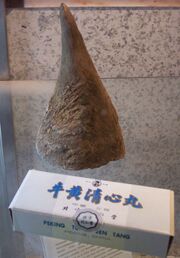Assessment |
Biopsychology |
Comparative |
Cognitive |
Developmental |
Language |
Individual differences |
Personality |
Philosophy |
Social |
Methods |
Statistics |
Clinical |
Educational |
Industrial |
Professional items |
World psychology |
Biological: Behavioural genetics · Evolutionary psychology · Neuroanatomy · Neurochemistry · Neuroendocrinology · Neuroscience · Psychoneuroimmunology · Physiological Psychology · Psychopharmacology (Index, Outline)
An aphrodisiac is an agent which increases sexual desire.[1] The name comes from the Greek goddess of Sensuality Aphrodite.
Throughout history, many foods, drinks, and behaviors have had a reputation for making sex more attainable and/or pleasurable. However, from a historical and scientific standpoint, the desired results may be because their users have chosen to believe they will be effective (the placebo effect). Medical science has not substantiated claims that any particular food increases sexual desire or performance.[2]

A rhinoceros horn, believed by some to have aphrodisiac properties.
Some aphrodisiacs appear to gain their reputation from the principles of sympathetic magic, e.g. oysters, due to their shape. This also explains the trade in the phallic-looking horn of the rhinoceros, which is endangering this animal. Other animal-based aphrodisiacs gain their reputation from the apparent virility or aggressiveness of the animal source — such as tiger penis — also endangering the species.
Aphrodisiac drugs[]
Testosterone[]
Libido is clearly linked to levels of sex hormones, particularly testosterone. When reduced sex drive occurs in individuals with relatively low levels of testosterone (e.g., post-menopausal women), testosterone supplements will often increase libido. Natural testosterone production may be enhanced by boosting levels of sex hormone precursors, such as DHEA, or by increasing the body's production of luteinizing hormone, which plays a key role in converting DHEA into sex hormones. Luteinizing hormone production may be boosted through use of herbs such as tribulus terrestris or eurycoma longifolia.
These approaches may be less useful in individuals with normal testosterone levels, as the body's regulatory mechanisms tend to respond to an excess of testosterone by shutting down its own testosterone production, and/or by producing sex hormone binding globulin ("SHBG"). SHBG attaches itself to sex hormones already in the system, rendering them inactive. A surplus of SHBG may be alleviated through consumption of substances, such as avenacosides found in oats, which closely resemble sex hormones. It is thought that these bind to SHBG, reducing the amount of SHBG which is available to bind to actual sex hormones, although research in this area is still scanty.
Yohimbine[]
Yohimbine is the main alkaloid of Yohimbe. As a weak MAO inhibitor and alpha-adrenergic agonist, yohimbine may increase genital bloodflow and sexual sensitivity for some people.
Bremelanotide[]
Formerly known as PT-141, it is currently undergoing clinical trials are currently testing it for the treatment of sexual arousal disorder and erectile dysfunction. It is intended for both men and women.
PEA[]
There is some debate in lay circles as to whether a chemical called phenylethylamine present in chocolate is an aphrodisiac. This compound, however, is quickly degraded by the enzyme MAO such that significant concentrations do not reach the brain.
Other drugs[]
Stimulants affecting the dopamine system such as cocaine and amphetamines (e.g. Methamphetamine, aka Crystal meth) are frequently associated with hyperarousal and hypersexuality, though both may impair sexual functioning, particularly in the long term.
Drugs not considered aphrodisiacs[]
Psychoactive substances like alcohol, 2C-B and MDMA are not aphrodisiacs in the strict sense of the definition, but they can be used to increase sexual pleasure and to reduce inhibition.
Anti-erectile dysfunction drugs, such as Viagra and Levitra, are not considered aphrodisiacs because they do not have any mood effect.[How to reference and link to summary or text]
Aphrodisiac foods[]
Some natural items purported to be aphrodisiacs when ingested (not at all exhaustive):
- Arugula (Rocket)
- Asparagus
- Balut
- Chocolate
- Damiana
- Eurycoma longifolia
- Ginkgo biloba
- Ginseng
- Maca
- Oysters
- Spanish fly (cantharidin)
Some newly introduced exotic fruits or vegetables often acquire such a reputation, at least until they become more familiar; for example:
- Eringoes (the sea holly, Eryngium maritimum)
- Potatoes
- Tomatoes
- Pine nuts [3]
- Truffles
- Fish
- Sea Cucumber
- Turtle eggs
- Artichokes
- [Strawberries
External links and references[]
- Aphrodisiac Foods of Love - Cooking with Aphrodisiacs
- Gabriele Froböse, Rolf Froböse, Michael Gross (Translator): Lust and Love: Is it more than Chemistry? Publisher: Royal Society of Chemistry, ISBN 0-85404-867-7, (2006).
- The Roe Mantic Gems of the Ocean
- Aphrodisiology A collection of articles and essays on aphrodisiacs.
Sources[]
See also[]
| This page uses Creative Commons Licensed content from Wikipedia (view authors). |